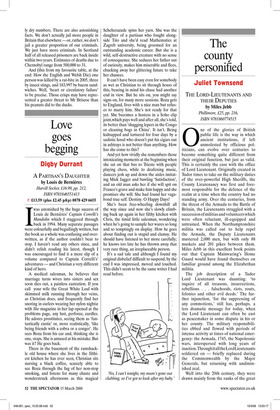Love goes begging
Digby Durrant
A PARTISAN’S DAuGHTER by Louis de Bernières Harvill Secker, £16.99, pp. 212, ISBN 9781846551413 ✆ £13.59 (plus £2.45 p&p) 0870 429 6655 Iwas astonished by the huge success of Louis de Bernières’ Captain Correlli’s Mandolin which I staggered through back in 1994. Many separate passages were colourfully and beguilingly written, but the book as a whole was confusing and overwritten, as if the author couldn’t bear to stop. I haven’t read any others since, and didn’t relish reading his latest, though I was encouraged to find it a mere slip of a volume compared to Captain Correlli’s’ adventures — and Christian a very different kind of hero.
A medical salesman, he believes that marriage turns wives into sisters and sex soon dies out, a painless castration. If you call your wife the Great White Loaf with skimmed milk running through her veins, as Christian does, and frequently find her snoring in curlers wearing her nylon nightie with She magazine in her lap opened at the problems page, any lust, perforce, curdles. He adores prostitutes, seeing them as ‘fantastically exotic’ or, more realistically, ‘like being friends with a cobra or a conger’. He sees Roza from his car and, thinking she is one, stops. She is amused at his mistake. But was it? He goes back.
There in the basement of the ramshackle old house where she lives in the filthiest kitchen he has ever seen, Christian sits nursing a black coffee, scarcely able to see Roza through the fug of her non-stop smoking, and listens for many chaste and wonderstruck afternoons as this magical Scheherazade spins her yarn. She was the daughter of a partisan who fought alongside Tito and she’d read Mathematics at Zagreb university, being groomed for an outstanding academic career. But she is a wild, self-destructive creature with no sense of consequence. She seduces her father out of curiosity, makes him miserable and flees, chucking away her glittering future to take her chances.
It can’t have been easy even for somebody as wet as Christian to sit through hours of this, bearing in mind his chase had another end in view. But he sits on, you might say signs on, for many more sessions. Roza gets to England, lives with a nice man but refuses to marry him. She’s not ready for that yet. She becomes a hostess in a Soho clip joint,which pays well and after all, she’s told, its better than ‘shagging lepers in the Congo or cleaning bogs in China’. It isn’t. Being kidnapped and tortured for four days by a sadistic hood who doesn’t put his cigars out in ashtrays is not better than anything. How has she come to this?
And yet how vividly she remembers those intoxicating moments at the beginning when she sat on that bus to Trieste with people playing chess, while to deafening music, dancers jerk up and down the aisles imitating Mick Jagger and bawling ‘Satisfaction’, and an old man asks her if she will spit on Franco’s grave and make him happy and she promises she will. She had found her vagabond true self. Destiny. O Happy Days!
She’s been free-wheeling downhill all the way since and now she’s slowly climbing back up again in her filthy kitchen with Chris, the timid little salesman, wondering when he’s going to sample her wares so long and so temptingly on display. How he goes about finding out is stupid and clumsy. He should have listened to her more carefully; he knows too late he has thrown away that very rare thing, an irreplaceable person.
It’s a sad tale and although I found my original disbelief difficult to suspend, by the end I was impressed, moved and touched. This didn’t seem to be the same writer I had read before.


























































































 Previous page
Previous page